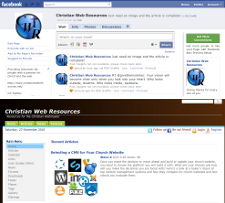You may be faced with this question and wonder how to approach it. There is 1 major question and several more to help us answer it - what is the barrier to entry and return on investment?
The Big 3 - Time, Talent and Money
- How much time do you have?
- How much skill do you have?
- How much money do you have?
Odd how it these 3 are ever-present in making decisions. They also must be considered in combination. If you aren't pressed for time, or have a lot of time to spare, the need for talent and money goes down. If your project has a short timeline, you'll need to have a great deal more skill or money to complete the launch on time. Likewise, if you have a fair amount of talent, you can launch the project sooner, relying on fewer outside resources (money). Be sure to have a clear understanding of these 3 resources as you begin your adventure of communicating your message online.
If you don't have time, skill or money, you will need a different set of tools to work with and, believe me, they are out there!
Strategy and Maintenance
Once you've established the parameters of your project, you'll need to consider how you'll connect that with your church's ministry and message -
- How will people find out about you? (Discovery)
- How will they know when you've posted something new? (Notifications)
- How will you maintain your information or add functionality? (Ease of Use)
- How will you moderate your information? (Moderation)
These last questions help determine the nuts and bolts for delivering your online message. This isn't the Field of Dreams, where if you build it they will come. You need to tell people where you are and how to find you. You need to let them know when you've added something new. You need a way to spread your message to other listeners and stay in touch with those who are listening. Time, talents and money do play a part in answering these questions, but these efforts are ongoing efforts, while your launch had a fixed duration and resource expenditure.
So far, we still haven't directly answered our burning question - Facebook fan page or website? 1 more disclaimer before we get to the specifics - these 2 things are not mutually exclusive and serve the same purpose in different ways. Choosing 1 will not prevent you, nor should it, from also developing the other. In fact, your overall strategy should include your plan for developing both facets of your online message for your church or ministry. This is all about prioritizing and focusing your efforts, given the 2 primary options.
Let's see how the 2 Big Choices measure up against the Big 3.
Time
Most people will say they have more time than money, but that isn't always the case. To establish your own website, you'll need to have some extra time. First, you'll need to select and purchase (register) your domain name (web address). This can be rather simple, especially if the name you select is available and you don't need to find an alternative. But, with how many churches share a similar name, you'll probably find yourself using a combination of your church's name and your city.
After you get your domain name, you'll need to get a place for your site to hosted. Lots of choices and a wide range of prices, but you should be able to find a suitable host that will be ready for you to add your site in a matter of a few hours. It can take up to a day or 2 for the rest of the Internet to be able to find your site, so plan on being viewing a site on a new domain and hosting account within 48 hours of starting. That is assuming you have content ready to publish.
The design, building and deploying a new website generally requires some planning, adjusting and rework before you launch. There are a myriad of decisions to make about structure, style, design, functionality and maintenance. Depending on your organization, you may meet for several weeks to work out all those details. If you already have a detailed plan for your website, but need it designed and built, 1 to 2 weeks is not a unreasonable length of time for this to take.
Contrast all this with creating a fan page on Facebook. Select a page name - usually much easier than selecting and acquiring a domain name. Domain names usually go much quicker than a page name in Facebook. So, a few minutes is all it takes.
No need to look for a host - your fan page will live on Facebook. No time used here. Plus, your page is instantly available once you publish it.
Design, build, structure and functionality are also rather simple with Facebook. You can get rather elaborate and have custom applications written for you, but there are already thousands of free applications available for you to choose from to complete the construction of your page. But, give yourself a 1/2 day for research and selection of a few basic applications, if you haven't already had time to figure out what you'd like to use.
The summary - Basic Website: 2 days - 2 (or more) weeks; Facebook: 1/2 day
Talent
Not only do you need some time to get your site started, you'll need a little bit of knowledge and talent for selecting a domain name registrar, selecting and setting up your hosting account, and building your website. Web hosts are working hard to lower this barrier and offering some turnkey solutions for people.
Again, Facebook has lowered the barrier for people to create pages and add content. No special software to use, no extra files to upload, no geeky commands to type to change a setting. You can, of course, go all out and develop your own custom applications to use on your page, but it usually isn't necessary and definitely isn't required.
The summary - Website: moderate skills; Facebook: basic skills
Money
While you might run across some very cheap domain registrars and hosting plans, you won't find any free ones. Domain registration and hosting costs are ongoing costs, so you'll have a commitment you'll need to keep. You can find free solutions for creating and building your website, but you might need to find some talent to help get to be just what you want.
Domain registrations - $15/year
Basic shared hosting - $5/month
Total for the cheapest website - $75/year, ongoing
If you need to have a design created and any customized functionality, prices range from $25 to $5000.
Facebook - free.
I'll let you do the rest of the math!
The 4 other areas dealing with Discovery, Notifications, Ease of Use and Moderation deserve some attention, too.
For a standalone website, your new site will be discovered by search engines, but it may take a while, even when you do submit your site to be indexed. Knowledge of your site will make its way around the web as you spread the news about it and as those that do know about it spread the news, too. Rarely do I know if someone I know has visited a site before me, unless they've told me about it or have left a comment or post on the site. The very nature of Facebook, however, lets me know what pages my friends like and where they are posting comments, Because of this, it is quite likely more people will discover your fan page before they know about your website.
Most websites are built to allow people to get notices when anything changes by subscribing to RSS feeds provided by you. Using a feed reader, like Google Reader, they can collect new posts from all over the web without having to visit the sites. Your site may also have other methods of updating members, through emails or text messages. A member of Facebook automatically is updated by their friends' activities and by the pages they like. Signing up for notices from your site or adding your RSS feeds to their readers requires a little more effort and tech saavy.
The question of ease of use I'll call a tie - while there are websites that are built and maintained with some specialized software and require special skills, you wouldn't pick that unless you knew how to use them. That said, you do have to pick the right tools for your site to be easily updated by others.
Finally, Moderation - if your site will have no user contributed comments or posts, moderation isn't going to be an issue. However, if you do, someone will have to monitor submissions and deal with them. Not too big of a problem. But, a person can have only 1 identity on Facebook and anonymous posts are not allowed. With only 1 identity, people tend to protect it and behave, at least a little bit better, on Facebook. On your site, you don't have any way of connecting people with identities on other sites, so it is a bit easier to post without consequences.
Wrap Up
You aren't the only facing these decisions - I face them in projects I work on, businesses face them and even Guy Kawasaki faces them.
All-in-all, Facebook has lowered the barrier to entry and made establishing a online identity for your church or ministry dead simple with no costs, unless you go into customization. You can get started sooner, cheaper and with less technical skill than you can on a standalone website. Why wouldn't you create a fan page?
Now, I wouldn't stop with a fan page - as time, money and talent allow, also build your website. Facebook is supported by advertisers, so visitors to your fan page will always see ads and you can't control which ones. You will also be stuck with the way Facebook looks. It will always look like Facebook, with your information tucked inside. A content management system hosted separately on a domain name you control can give you the ability to totally build in some functionality you would be hard-pressed to do in Facebook at a reasonable price. Plus, on your own website, you can cut out the other noise going on around you. Your site is dedicated to delivering your message and on Facebook your message is squeezed between everyone else's.
If you haven't done either a fan page or a website, start with a fan page and work towards a website. If you have a website, get your fan page started and tie it to your website. Now - go and do likewise!






